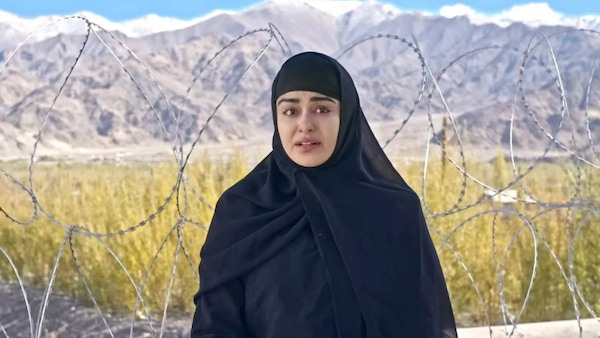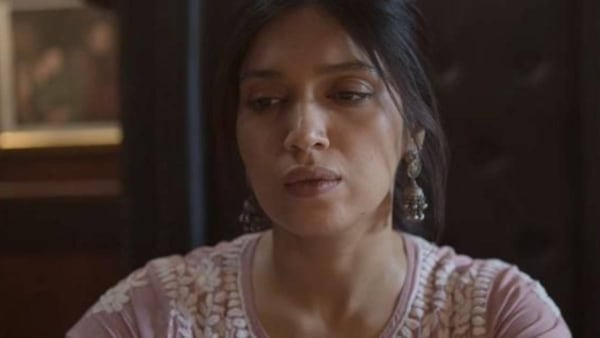Afwaah, The Kerala Story & A Tale Of Two Indias
This is #CriticalMargin, where Ishita Sengupta gets contemplative over new Hindi films and shows. Today: The Kerala Story, and Sudhir Mishra's Afwaah.

Last Updated: 02.54 PM, May 07, 2023
IT SAYS SOMETHING about the current state of India that Sudhir Mishra’s Afwaah and Sudipto Sen’s The Kerala Story have released on the same day. The overlap is not just a detail but tells a wider story of the country we have come to inhabit, the robust divisiveness spreading across a borderless nation, and the surging bigotry that has reduced ideology to a tug of war. Both films are made not just by two different filmmakers but two different kinds of filmmakers working in Hindi cinema today; the gap between them is imbued with diverging political leanings rather than contrasting personal styles which ultimately, and more crucially, says everything about the current political landscape of the Indian state.
Watching Hindi films today has become an exercise in suspicion. The guards always need to be up. Propaganda and jingoism have become so mainstream that they meld with commercial conventions and creep up in unforeseen ways. Even when communal violence does not form the centerpiece in fictional outings, narrative disenfranchisement of minorities — primarily the Muslim community — and inflated tales of bravery of Hindus have become rampant. A large section of Hindi films today freely use creative license and technical skills as a shield to concoct fiction as facts, thus compelling a discerning audience to be more attuned than just commit superficially.
But for a film like The Kerala Story, Sen’s recent work and a firm addition to this puerile canon, even a surface-level scanning is enough to recognise the intent. The film is so inept at all levels of filmmaking that it is neither interested nor capable of crafting sly embellishments to hide its agenda. Its objective of hate mongering towards the Muslims is so blatant that it resists — and denies — any intellectual engagement. The central focus, as revealed in the contentious trailer, is on the forcible conversions of Hindu women in Kerala to Islam for the purpose of recruiting them to Islamic State of Iraq and Syria (ISIS, now known simply as IS), a militant group that rose in 2014 as an offshoot of al Qaeda and believes in its own extremist understanding of Islam. The makers had also claimed that around 32,000 women had fallen victim to this, an assertion they haven’t been able to back up since, and thus altered the number to three.

These, however, are external details. If Sen’s film is to be believed, Muslims are a bloody-thirsty, heinous ‘tribe’ whose sole purpose is converting every susceptible Hindu woman to Islam and using their bodies for babies. Nuance is sacrificed at every scene to draw one dangerous stereotype after another. His interpretation of the community is so menacing that he stops at nothing from insinuating at their brutality. In one scene a Muslim man rapes a pregnant Hindu woman because, he says, in Islam women exist to be obedient to their husbands. In another, a Hindu girl, who has been converted since, spits at her ill father because he is an atheist and she has been “brainwashed” into believing that it is a sin according to Islam. The director takes every possible opportunity to underline the beleaguered status of Hindus in a country where they occupy the majority population.
The Kerala Story centers on three young girls who join a nursing course in Kerala’s Kozhikode. There is Shalini Unnikrishnan (Adah Sharma), Geetanjali (Siddhi Idnani) and Nimah Mathews (Yogita Bihani). There they meet Asifa (Sonia Balani) who is involved with a radical Islamic group and entrusted with the task of converting the girls and sending them to Syria. Everything in the outing unfolds like a farce: the girls not attending a single class but having all the time in the world to listen to Asifa spew nonsense about religion, them later questioning their Hindu gods (Ram, Shiva) on hearing that they were “not men enough to protect themselves”, few men assaulting them in a mall which convinces them to wear a hijab, and finally falling in love and agreeing to have sex with two Muslim boys because their bodies said “qabool hain” (“we consent”). A man, touted to be a Communist, has a red communism flag outside his house, Karl Marx’s poster on the wall.
But then again, it is baseless to dissect these moments because The Kerala Story, right from the first frame to the last, wants to do nothing but fan the flames of jingoism. Every heightened emotion and every ridiculous plot point is introduced with an expressed agenda-driven purpose. Critiquing such a film thus feels like a defeating task.
The worrying bit in all this is the irresponsibility with which the outing takes an issue which exists, albeit in lesser magnitude, and then distorts it for its self-serving interest. According to a News Minute report, back in 2016 around 17 people from Kerala were apprehended to be recruited into ISIS, which included even Muslims. This is an important detail because what The Kerala Story deliberately chooses to sidestep is that the conversion of Hindu girls to Islam or inter-faith marriage is not the problem the country is dealing with right now, extremism of religion is…any religion. Sen, however, viciously purports that they are one and the same thing, only when the religion is Islam.
Mishra’s Afwaah (‘Rumour’ in English) unfolds as a consequence of believing in the mistruths that films like The Kerala Story have been peddling. The filmmaker’s recent work, and his first theatrical release in five years, is a brazen take on the current political climate where social media is being weaponised to revamp fiction as facts, resulting in grave consequences.

The film is about one night in a fictional place in India called Western Province (modelled on the infamous lawlessness of Uttar Pradesh) when a politician’s daughter Nivi (Bhumi Pednekar) runs away from home after being disillusioned with the religious bigotry her father’s party espouses. Her fiancé Vicky Singh (Sumeet Vyas) is a young politician on the rise. Their impending marriage is an agreement. When Nivi absconds, Vicky is left red-faced. He sends his goons to look for her. On that fateful night, her life intersects with Rahab Ahmed (Nawazuddin Siddiqui), a US-returned, jazz-loving, Range Rover-driving Muslim man. In a scuffle between Vicky and Nivi in the middle of the road, Rahab intervenes to help and their lives get intertwined.
Mishra trades subtlety for broader strokes. When Nivi and Rahab run away together, Vicky posts their pictures on social media, suggesting that it is a case of Love Jihad, an Islamaphobic narrative based on a fabricated claim that Muslim men lure Hindu women in the guise of love for forcible religious conversions. When Vicky wants to get hold of a truck he has been looking for, he digitally spreads the news that the vehicle is carrying beef. This rumour incites the local Hindu residents, transfiguring the crowd into a lynching mob.
It needs to be said that a lot in Afwaah gets simplified. The depiction of the way things are made viral on social media feels abridged in depth. That a bigoted Hindu man is saved by a Muslim truck driver feels like a convenient segue although Mishra offsets the contrived nature of the moment by holding back any dramatic change of heart. Nivi’s character, a liberal in a fanatic household, is not given a context to justify her liberalism. She is designed as an outsider for the sake of conveying the anger and disappointment of a Hindu, liberal filmmaker. Mishra’s voice gets more pronounced in the second half as he hits out at the armchair liberalism of lit-fest attendees, implying that their refusal to step out of their cushioned existence makes them equally complicit in the current ruin of decency.
In all respects, Afwaah is caught at the crossfire of intent and execution. When a Muslim man, writhing with pain on being stabbed, falls on stage at a festival and the spectators, unaware of the reality of the moment, clap holding their wines, the awkward staging of the scene reveals the stunted inefficiency of filmmaking. Mishra’s intent of orchestrating a modern-day farce comes undone with the rustiness of his approach.
The other way to watch the film is to put it in a social context and uncover the engineered simplification as deformed reality. If we reckon with the hyper divisiveness of the country we have come to inhabit where a rumour spread through WhatsApp forward is capable of stirring mob-related violence then maybe we are that volatile and gullible. If a film like The Kerala Story, which makes no effort to hide its intention of heightening the phony persecution complex of the majority population, gets bankrolled by a big production house (Vipul Shah is credited as the creative director and producer), then we probably are at the mercy of political parties that treat communal violence as vote-canvassing. Sen was not wrong in implying that religion is being radicalised except, as Afwaah intervenes to course correct, that religion is not Islam. Mishra, however, remains correct throughout: as a nation we have been rendered so hostile to peace that we will believe anything, even if it is an outing that claims 32,000 Hindu women were forcibly converted to Islam, with no evidence.
The tragedy here is that the film which is rooted in reality has to take the subterfuge of a fictional place to tell its truth, while the other which is perpetuating falsehood is adorning the name of a real place and using fake data with impunity. The bigger tragedy is the impossibility of dismissing one and disbelieving the other. Because, they document a curious time in India when fiction is reduced to facts and facts are rewritten as history.

 Premium
Premium